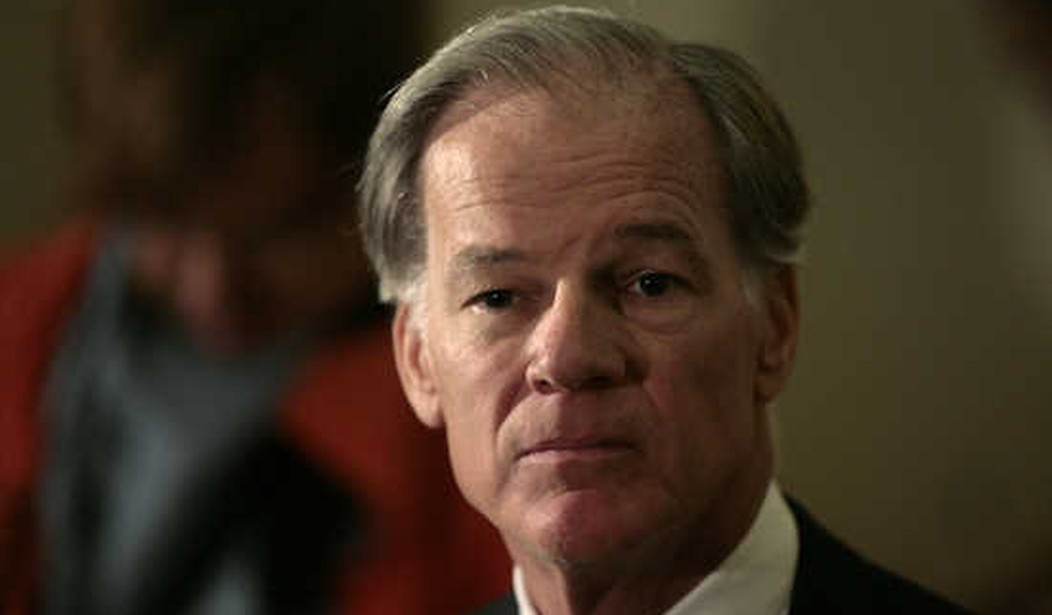Former U.S. Ambassador to Ireland Tom Foley emerged from the Connecticut Republicans nominating convention for governor with the GOP nod, but will still have to square off against two other candidates in an August primary to determine who will face incumbent Gov. Dan Malloy in November.
If Foley is victorious in the primary, the 2014 election will mirror 2010’s – in which Malloy defeated Foley 49.6 to 48.9 percent.
Danbury Mayor Mark Boughton and Senate Minority Leader John McKinney both garnered more than 15 percent of the vote, the threshold allowing candidates into the primary. McKinney was pushed over the top with help from Shelton Mayor Mark Lauretti, who gave 16 delegates to McKinney. Lauretti said prior to the convention that he had only been in the race for “four months.”
“McKinney has been in it for over a year; Boughton has been running for five years, Foley has been running for five years,” Lauretti said, explaining how the candidates had an advantage over him in a May 9 Quinnipiac University poll
Boughton said before the primary that he had not spent “a single dime” on his campaign at that point.
West Hartford town council member and Second Amendment rights activist Joe Visconti also failed to reach the 15 percent threshold.
Visconti, the only “gun candidate” following the departure of Tea Partier Martha Dean, said he would continue petitioning in an effort to be included in the primary. He would need to get 2 percent of the names of the state’s registered Republicans on the petition in order to keep his campaign alive.
Dean’s departure from the race followed the Quinnipiac poll results. The poll found Dean had only 5 percent of respondent support. In a statement following her exit she said she would help “whoever is the GOP nominee win in November.”
Foley’s victory at the convention comes as no surprise. The Quinnipiac poll found him to be the favorite to win the Republican nomination ahead of the convention – by a wide margin. Foley garnered 39 percent while the only other candidates to register over 5 percent in the poll were his primary challengers Boughton and McKinney with 9 percent and 8 percent, respectively.
The Quinnipiac poll found incumbent Malloy tied with Foley 43-43 percent. In the same poll, respondents said Malloy does not deserve to be reelected, 48-44 percent.
“It’s deja-vu all over again as Connecticut Gov. Daniel Malloy and 2010 Republican standard-bearer Tom Foley remain locked in a dead heat,” said Douglas Schwartz, director of the Quinnipiac University poll.
Respondents did have a slightly (46-45 percent) more favorable view of Malloy over Foley – a rate that has held steady at 46 percent since the June 19 poll. Malloy also eked out approval in how he is handling his job as governor, 48-46 percent.
Abe Scarr, director of ConnPIRG, said prior to the convention that he was not surprised at the dead heat due to how close the 2010 race was between the two candidates and that if the two were to square off again in this election a close race should be anticipated, which he said was positive for the state.
“The state has been dealing with a lot of controversial issues, so I think we can anticipate a close election again if those are the two nominees,” he said. “Close elections are good because they engage people.”
Lauretti said before the convention that the dead heat between Malloy and Foley does not bode well for the incumbent governor, who he says is responsible for the state’s poor economy.
“It’s anything but good,” Lauretti said regarding the economic climate in the state. “When you have to pay businesses to stay in your state something is pretty wrong.”
So far it seems whoever the GOP nominee is will, like Lauretti, attack Malloy on his handling of the state economy.
State Republican Party Chairman Jerry Labriola, Jr. attacked Malloy’s economic record in a statement responding to the Quinnipiac poll results, saying the results of the poll “prove what we’ve known all along, voters are tired of Malloy’s mishandling of the Connecticut economy.”
According to the poll, 40 percent of respondents said the state of Connecticut’s economy is “not so good,” while 30 percent said it was “good” and 29 percent said it was “poor.” Forty-nine percent placed “some” blame on Malloy for the state of the economy, 27 percent said “a lot” of the blame was his and 17 percent said he deserved “not much” of the blame.
Labriola called the state’s unemployment rate and “pervasive economic insecurity” the “new normal according to [Malloy].”
In a message to his supporters posted to his website shortly after the convention results were announced, Foley said Malloy’s tenure has resulted in “outrageous property tax increases, unemployment and government corruption.”
The Connecticut Department of Labor estimates the state’s unemployment rate was 7 percent for March, which is slightly higher than the 6.7 percent national average.
“Contributors to my campaign have told me they are supporting me because of their concerns for their families and the future of Connecticut,” Foley said mid-month after exceeding the $250,000 contribution requirement to receive public financing. “We are going to win the race for governor so we can alleviate those concerns by bringing back the opportunity, optimism and pride we had before Governor Malloy was elected.”









Join the conversation as a VIP Member